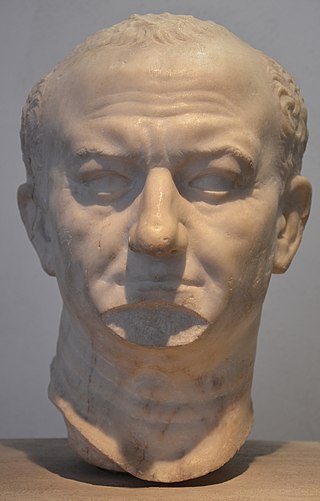Related Research Articles

The 80s was a decade that ran from January 1, AD 80, to December 31, AD 89.

Titus Caesar Vespasianus was Roman emperor from 79 to 81. A member of the Flavian dynasty, Titus succeeded his father Vespasian upon his death.

Apollonius of Tyana was a first-century Greek philosopher and religious leader from the town of Tyana, Cappadocia in Roman Anatolia, who spent his life travelling and teaching in the Middle East, North Africa and South Asia. He is a central figure in Neopythagoreanism and was one of the most famous "miracle workers" of his day.
Philostratus or Lucius Flavius Philostratus, called "the Athenian", was a Greek sophist of the Roman imperial period. His father was a minor sophist of the same name. He flourished during the reign of Septimius Severus (193–211) and died during that of Philip the Arab (244–249), probably in Tyre.
Empusa or Empousa is a shape-shifting female being in Greek mythology, said to possess a single leg of copper, commanded by Hecate, whose precise nature is obscure. In Late Antiquity, the empousae have been described as a category of phantoms or spectres, equated with the lamiai and mormolykeia, thought to seduce and feed on young men.

Dio Chrysostom, Dio of Prusa or Cocceianus Dio, was a Greek orator, writer, philosopher and historian of the Roman Empire in the 1st century AD. Eighty of his Discourses are extant, as well as a few letters, a mock essay Encomium on Hair, and a few other fragments. His sobriquet Chrysostom comes from the Greek chrysostomos, which literally means "golden-mouthed".

The gens Flavia was a plebeian family at ancient Rome. Its members are first mentioned during the last three centuries of the Republic. The first of the Flavii to achieve prominence was Marcus Flavius, tribune of the plebs in 327 and 323 BC; however, no Flavius attained the consulship until Gaius Flavius Fimbria in 104 BC. The gens became illustrious during the first century AD, when the family of the Flavii Sabini claimed the imperial dignity.
Damis was a student and lifelong companion of Apollonius of Tyana, the famous Neopythagorean philosopher and teacher who lived in the early 1st up to the early 2nd century AD.

Sases, also known as Gondophares IV Sases, was an Indo-Parthian king who ruled in northwestern parts of India in modern Pakistan. He is only known from coins and ruled for at least 26 years during the mid-1st century CE.
Titus Flavius T. f. T. n. Clemens was a Roman politician and cousin of the emperor Domitian, with whom he served as consul from January to April in AD 95. Shortly after leaving the consulship, Clemens was executed, allegedly for atheism, although the exact circumstances remain unclear. Over time, he came to be regarded as an early Christian martyr.

Life of Apollonius of Tyana, also known by its Latin title Vita Apollonii, is a text in eight books written in Ancient Greece by Philostratus. It tells the story of Apollonius of Tyana, a Pythagorean philosopher and teacher.
Titus Flavius T. f. T. n. Sabinus was a Roman senator, who was active during the second half of the first century AD. He was the son of Titus Flavius Sabinus, consul suffectus in AD 69. In that year the younger Sabinus was besieged with his grandfather in the Capitol, but escaped when it was burnt down. He married Julia Flavia, the daughter of his cousin, the future emperor Titus.
Euphrates was an eminent Stoic philosopher, who lived c. 35–118 AD.
Alexander, nicknamed Pēloplátōn, also known as Alexander of Seleucia and Alexander the Platonic, was a Greek rhetorician and Platonist philosopher of the age of the Antonines and the Second Sophistic.
Rhoiteion was an ancient Greek city in the northern Troad region of Anatolia, also known as Ῥοίτιον ἄκρον. Its territory was bounded to the south and west by the Simoeis river and to the east by Ophryneion. It was located on the Baba Kale spur of Çakal Tepe north of Halileli and west of İntepe in Çanakkale Province, Turkey.

Aplysia depilans, the depilatory sea hare, is a species of sea hare or sea slug, a marine opisthobranch gastropod mollusk in the family Aplysiidae. Its name has led to a folk etymology that its consumption caused hair loss.
Pompeius Silvanus, fully Marcus Pompeius Silvanus Staberius Flavinus or Flavianus, was a Roman senator who was consul twice.
The Siege of Tyana occurred in 272 CE. The forces of the Roman Emperor Aurelian were seeking to conquer the Palmyrene Empire.
Gaius Luccius Telesinus was a Roman senator who was active during the first century CE. He was ordinary consul for the year 66 with Gaius Suetonius Paulinus as his colleague. In Philostratus' Life of Apollonius, Telesinus had been depicted as a pious consul conversing with Apollonius of Tyana. He allows Apollonius entry into Rome's temples, his residence there, and adoption of Apollonius' reforms by the temples. According to Philostratus, Telesinus continued to study philosophy under Apollonius.
Servius Cornelius Scipio Salvidienus Orfitus was a Roman senator who lived in the first century AD. He was a descendant of Orfitus, who was adopted by Servius Cornelius Scipio, an otherwise unknown member of the patrician branch of the Cornelii Scipiones.
References
- ↑ Werner Eck, "Jahres- und Provinzialfasten der senatorischen Statthalter von 69/70 bis 138/139", Chiron , 12 (1982), pp. 306-313
- ↑ Paul Gallivan, "The Fasti for A. D. 70-96", Classical Quarterly , 31 (1981), p. 191
- ↑ Philostratus (1809). Life of Apollonius of Tyana . Retrieved 7 October 2014.